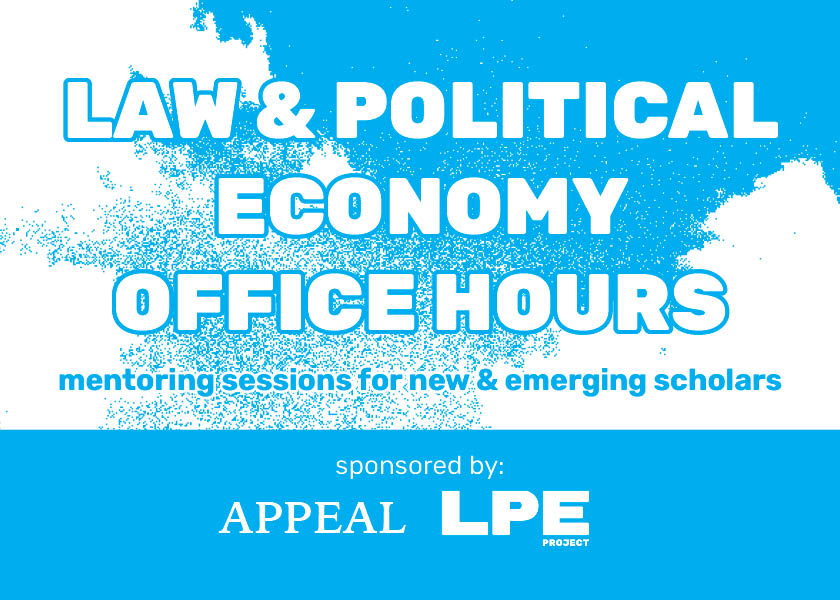Please join the LPE Project and APPEAL for our next informal mentoring session!
When: Friday January 20, 2023 at 4:15 – 5:15pm EST, (UTC-5) via Zoom (link will be provided to accepted registrants)
Registration & Deadline: SIGN UP HERE by Wednesday, Jan. 18 at 12PM ET. Space is limited!
Who: We welcome law students and graduate students interested in law school teaching to join us for a small group discussion with faculty about research interests and career strategies.
Participating Faculty:
Professor Blake Emerson, UCLA School of Law.
Areas of Expertise: administrative law, structural constitutional law, and political theory.
Faculty Bio (excerpt): Professor Emerson draws on resources from political theory and American political development to understand the structure and purpose of the regulatory state. He studies questions such as: What role have federal government agencies played in interpreting and implementing civil rights and other fundamental public values? How can legal doctrine ensure that agencies address such significant policy issues in a reasoned and inclusive fashion? In what ways have the diverse institutions of the American state realized, or failed to live up to, democratic principles? Emerson’s book, The Public’s Law: Origins and Architecture of Progressive Democracy (Oxford University Press, 2019), offers a history and theory of democracy in the American administrative state. He has co-authored two reports on federal agency best practices for the Administrative Conference of the United States, and written shorter contributions for Slate, the Notice and Comment Blog, Regulatory Review, and Law and Political Economy Blog.
Professor Michelle Wilde Anderson, Stanford Law School and Doerr School of Sustainability,
Areas of expertise: poverty and inequality, local government law, housing, and environmental justice.
Faculty Bio (excerpt): Professor Anderson combines legal analysis and humanistic reporting to understand and improve city and county governance of low-income urban and rural places. Professor Anderson’s new book, The Fight to Save the Town: Reimagining Discarded America (published by Simon & Schuster in June 2022) focuses on the dismantling and rebuilding of local government in high-poverty communities. Rooted in narrative portraits of urban and rural poverty, the book describes the fallout from decades of cuts to local government amidst rising segregation by income and race.
She has done place-based work focused on the water and infrastructure needs of high-poverty rural communities in the South and Southwest; rural land use challenges in California’s San Joaquin Valley; school reform in Memphis, Tennessee; public bankruptcy and insolvency in Detroit, Stockton, and Puerto Rico; local fiscal crisis and state interventions in Michigan, Pennsylvania, Oregon, and Rhode Island; and poverty in Oregon’s rural timber counties. Her national research has focused on the legal tools (including municipal dissolution, bankruptcy, and receiverships) designed to help city and county governments that are facing high levels of poverty as well as a budget crisis. Across her work, she has worked to understand how the history of racial segregation and ongoing implicit bias against Black, Latinx, and mixed-race neighborhoods/cities affect public investment, service delivery, and housing quality.
Guiding Thought (from Dr. John Haskell, University of Manchester Law):
We all face doors that seem locked in our lives at various moments. Sometimes they are; sometimes it is just a matter of the wrong key. Sometimes it is just that there are other doors we aren’t seeing. But there is always something to do about a situation and often the best way to get unstuck (or to stay unstuck) is to have opportunities to brainstorm with others. We hope these sessions help facilitate everyone to discover more and better choices in their professional and political life journeys.

